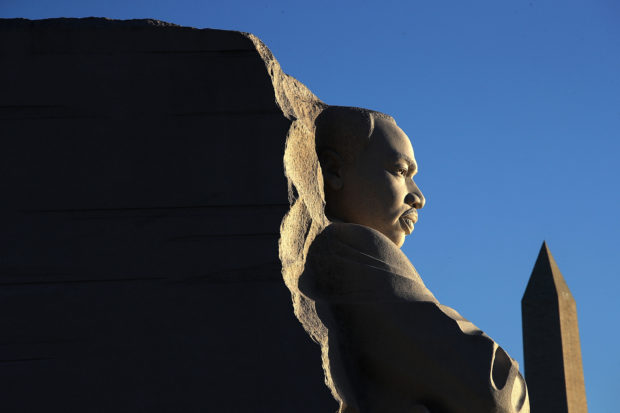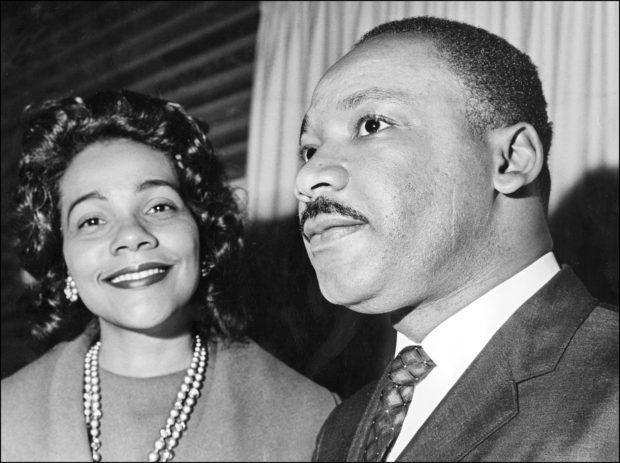A Pulitzer Prize-winning biographer of Martin Luther King, Jr. recently made a dive into recently-released FBI surveillance summaries, revealing what could be a “painful historical reckoning” for the legendary civil rights leader.
David Garrow, who won a Pulitzer for his 1987 King biography “Bearing the Cross,” detailed his shocking revelations in a article for the British magazine “Standpoint,” released Thursday.
While FBI surveillance tapes on King, initiated by former FBI Director J. Edgar Hoover, are being held in a U.S. National Archives vault until 2027, Garrow used “hundreds of never-before-seen FBI reports and surveillance summaries concerning King” that “have silently slipped into public view on the Archives’ lightly-annotated and difficult-to-explore web site” to uncover the latest revelations about the slain civil rights icon.

WASHINGTON, DC – JANUARY 15: The Martin Luther King Jr. Memorial is shown in the early morning light on Martin Luther King Day January 15, 2018 in Washington DC. Martin Luther King Jr. would have been 89 years old today. (Photo by Win McNamee/Getty Images)
King’s sexual promiscuity, much of which is laid out in more detail in Garrow’s lengthy and detailed report, has been known about for years. One allegation unearthed by the historian rises to a new level, however, revealing the alleged rape of a woman by a pastor friend of King, during which the civil rights leader “looked on, laughed and offered advice.” The alleged incident took place January 1964 at Washington, D.C.’s historic Willard Hotel, where King and a group of fellow ministers were scheduled to stay for three nights. Knowing this, FBI agents had bugged his room.
Garrow included links to archived material, along with his report:
Staying in one of the two targeted rooms was King’s friend Logan Kearse, the pastor of Baltimore’s Cornerstone Baptist Church and, like King, the holder of a Ph.D. from the Boston University School of Theology. Kearse “had brought to Washington several women ‘parishioners’ of his church,” a newly-released summary document from Sullivan’s personal file on King relates, and Kearse invited King and his friends to come and meet the women. “The group met in his room and discussed which women among the parishioners would be suitable for natural or unnatural sex acts. When one of the women protested that she did not approve of this, the Baptist minister immediately and forcibly raped her,” the typed summary states, parenthetically citing a specific FBI document (100-3-116-762) as its source. “King looked on, laughed and offered advice,” Sullivan or one of his deputies then added in handwriting.
A “sex orgy” the next day featured “acts of degeneracy and depravity” and “excessive consumption of alcohol” involving King, several Southern Christian Leadership Conference (SCLC) officers, “and others bearing the title of ‘reverend,'” the tape summaries revealed. While “many of those present engaged in sexual acts, natural as well as unnatural,” a woman who “shied away” was allegedly told by King that participating would “help your soul.”
At some point that night, King allegedly declared that he “preferred to perform unnatural acts on women and that he had started the International Association for the Advancement of Pu**y-Eaters,” the FBI summaries state.
When Dr. King’s wife, Coretta, accused her husband of “not fulfilling his marital ‘responsibilities'” during a recorded argument and added that “10 hours a month” spent at home “would be an exaggeration.” Her husband allegedly “told her she should go out and have some sexual affairs of her own.”

OSLO, NORWAY: Coretta Scott King and her husband Martin Luther King 09 December 1964 in Oslo where the US clergyman and civil rights leader received 10 December the Nobel Peace Prize. (Photo by AFP/Getty Images)
Former FBI Director Hoover famously ordered surveillance on King and others he suspected of being subversive and/or linked to the Communist Party, a practice legal under the “regrettably relaxed” standards of that time, but widely condemned today as unconstitutional. Hoover reportedly was able to obtain authorization from then-Attorney General Robert F. Kennedy to wiretap King after he “told Kennedy that King’s closest and most influential adviser, New York attorney Stanley D. Levison, was a ‘secret member’ of the Communist Party USA (CPUSA).”
Garrow wrote:
Kennedy’s aides, and finally his brother—the President of the United States—warned King to cease contact with Levison, but King’s promised compliance was dissembling: he and Levison communicated indirectly through another attorney, Clarence Jones, who, like Levison, was himself already being wiretapped by the FBI. Presented with evidence of King’s duplicity, plus FBI claims that King had told Levison that he was a Marxist, a reluctant Attorney General approved the FBI’s request to place King under direct surveillance too.
However, Garrow contended, as the surveillance progressed it “appears obvious in retrospect” that agents grew less concerned about any alleged Communist influence brought on by Levison and more obsessed with “King’s personal conduct.” That view seems bolstered by the fact that the FBI failed to stress Levison’s significant financial contributions to both Dr. King and the Communist Party USA in its memos to Kennedy at the time. (RELATED: MLK’s Niece Defends Trump Against Racist Accusations)
In addition to Dr. King and his SCLC, the FBI also used electronic surveillance and a vast network of informants to track what it considered extremist groups, from the Communist Party to the Black Panther Party to the Ku Klux Klan. At various points, significant percentages of those groups’ memberships were comprised of informants.
In King’s case, the former FBI director allegedly hoped his organization’s surveillance would cause the civil rights leader to commit suicide. Garrow described the “anonymous message” Hoover authorized Bureau officials to send King, along with “a tape-recording of his sexual activities.”
After telling King to “lend your sexually psychotic ear to the enclosure,” the letter warned that “you will find on the record for all time” audio evidence of “your adulterous acts, your sexual orgies” involving “various evil playmates” including “Dolores Evans.” Calling him “an evil, abnormal beast,” the letter instructed: “King, there is only one thing left for you to do. You know what it is. You have just 34 days in which to do (this exact number has been selected for a specific reason . . . There is but one way out for you. You better take it before your filthy, abnormal fraudulent self is bared to the nation.”
The historian ends his “Standpoint” piece by contending that, until now, “some voices” might have called for the complete destruction of the FBI records on King, but “the suggestion—actually more than one—that he either actively tolerated or personally employed violence against any woman, even while drunk, poses so fundamental a challenge to his historical stature as to require the most complete and extensive historical review possible.”



